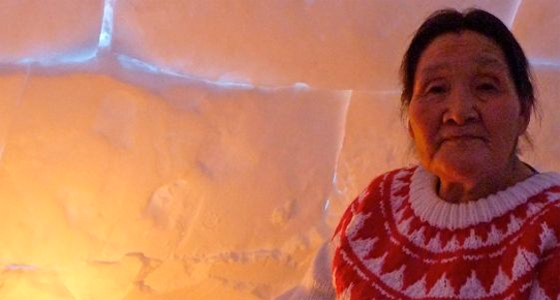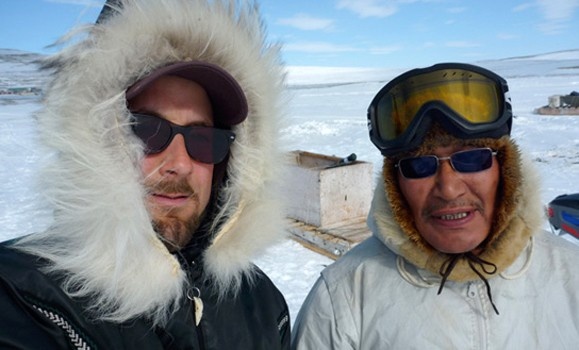Amidst a sea of digital toolsÔÇönotebooks, cellphones and laptopsÔÇöstudents and spectators gathered into their seats in Ondaatje Hall on February 9, ready to absorb insightful Inuit knowledge and explore the intimate connection between a people and their environment.
The latest instalment in an ongoing lecture and video series by the College of Sustainability, the evening brought critically acclaimed Inuit filmmaker Zacharias Kunuk (best known for 2001's Atanarjuat: The Fast Runner) and co-director Ian Mauro to ║┌┴¤│ď╣¤═°to showcase their environmental opus Qapirangajuq: Inuit Knowledge and Climate Change.
Hailed by critics as a groundbreaking and emotional exposition, the film explores the implications of climate change in the rapidly changing face of the Canadian arctic and the detrimental effects on the Inuit people who rely on it for survival. An Inuit language film, the bulk of the documentary is composed of interviews with Inuit elders and contrasted with sombre, submersive scenery ÔÇô shots of burning sunrises refract off of the jagged, chipped plains of ice.
Deeply personal opinions
"I can't say it's cold now," says an Inuit elder in the film. "In 1940, you would freeze your face when you went out hunting, stove fuel would turn to slush. But now, the ice is thin, it melts."
As a culture that relies on the environment for sustenance and spiritual guidance, the Inuit people have a poignant and deeply personal opinions on the effects of climate change. "My father would always take me outside and show me what the world was telling us," says one middle-aged Inuit man in the film. "I didn't realize it was educational, it was just life. We would see and hear these effects as they occurred in our lives and be able to predict patterns in the seasons and the weather.
"These days, it is impossible to predict anything. I gave up on that."

Deborah Qanauq, an Igloolik elder featured in the film.
Straddling the line between harrowing and hopeful, these gently spoken stories and rich, indulgent tales are offset by droning, stuttering electronic music and stark visuals of a decaying, transformed land. Polar bears roam through villages, hungry and increasingly hostile and an increase in southernly winds brings grey-green, sludgy deposits of acid rain, peppering the snow.
"If we don't have our environment, we can't survive," says an Inuit elder. "These biologists come here to study climate change, but they never ask us about it [...] they use helicopters that deafen bears, they drug and collar them, and then they claim they are endangered. It is the southerners who are endangering them."
Sharing voices
In an attempt to foster an open and engaged discussion about the issues, the filmmakers took the stage following the film to field some of the crowd's eager questions.
"Resolute Bay is built on mud and permafrost," said Mr. Kunuk, addressing a student's question about the possibility of Inuit migration. "The permafrost is melting and they are being swept into the water," he added grimly.
"We are already seeing a large amount of what we call 'climate change refugees,' forced out of their home regions," said Mr. Mauro, who is the Canada Research Chair in Human Dimensions of Environmental Change at Mount Allison University.
"The Inuit, these are people who are among the most affected by climate change, we study these effects in their area but we never ask these peopleÔÇöpeople who have been there their entire livesÔÇöwe never ask them what they think."
One ║┌┴¤│ď╣¤═°student asked why it was that the film included clips of Inuit elders positing some ÔÇťfairly crazyÔÇŁ scientific claims, such as the axis of the Earth shifting or biologists being to blame for the problem with polar bears.
"We are just giving the Inuit a chance to send a message," says Mr. Kunuk. "Only scientists are ever heard from when climate change is discussed. We need to tell our story. What gives people the right to require scientists to corroborate our claims when no one requires Inuit people to corroborate what scientists are saying? We merely wanted to let Inuit knowledge speak for itself."
Despite the harsh picture of impending hardships the film paints, Mr. Kunuk and Mr. Mauro are committed to taking it on the road as a message of hope and change, an attempt to wake people up to the bigger picture.
"There is hope," says Mr. Kunuk. "But we need courage. It is a broken system, but we can repurpose our ingenuity and apply it to sustainability. I think this film demonstrates that. My people, the Inuit people, they are of the land. We are adapting, we are trying. That gives me hope."

